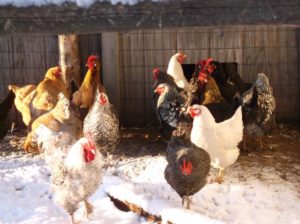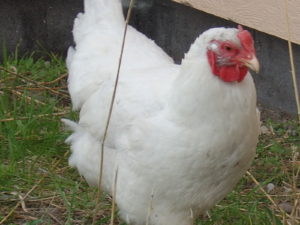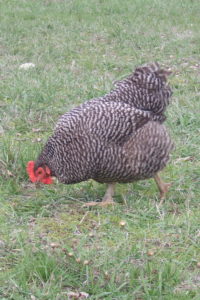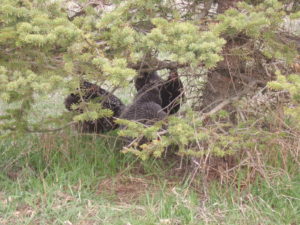
I enjoy chickens. This admission may sound odd, but it is true. I love the brilliant colors of their plumage. I like to listen to the chickens call to each other and “chat” among themselves. The brilliant orange-yellow of the yokes of eggs laid by free-range chickens is incomparable. Over the years that I have had chickens, I have learned about them and from them. Yes, I said that I have learned from my chickens. Here are five lessons I have learned.
Lesson 1. Never stop scratching and pecking
The chickens scatter across the yard after being released from the coop in the morning. They all begin their day’s work of scratching and pecking. I know that they are looking for seeds, insects, and even choice pieces of tender grass. They rest very little during the day. They scratch and peck at whatever they see.

A chicken’s persistence is inspiring. It reminds me not to give up easily. I cannot help but apply what I see with the chickens to my life. How persistent have I been in pursuing the things I consider essential? How many dreams have I disqualified because I was unwilling to keep scratching and pecking until I accomplished the goal?
When we have the chickens patrolling the yard, the number of bugs that get into the house drops dramatically. I find that worthwhile dreams and ambitions tend to help fill a need that others have. The chickens are only looking for lunch when they eat the bugs around the house, but they fulfill my desire to have an insect free house.
Chickens do not care what others think when they are on the trail of a juicy bug. I have watch hens zigzag across the lawn in pursuit of a grasshopper. The chase only ends when the grasshopper becomes lunch. An unfamiliar observer may think the chicken has become ill, watching its wandering path, but the hen is focused and does not care.
Every one cares to some extend what others think about them and their ambitions. This caring helps us to shape our responses and to understand the needs around us. Through this consideration, we can then channel our focus to help us reach our goal. While we must care about others, we cannot allow their dream-crushing comments to dissuade us from our goals.
Lesson 2. Test everything to see if it is worthwhile

I have watched chickens peck large rocks, pieces of angle iron, cars, pieces of glass, and even my shoes. Many times I have thought what is wrong with that bird? Doesn’t she know that she cannot eat that? Or doesn’t she see that the item is too big to swallow? My observations indicate that chickens are rather curious. They peck at everything the way we might reach out and touch things. (Or at least we did before this pandemic) The chickens are testing everything they strike with their beak.
We learn by trial and error. I prefer to observe and learn from the trial and error of others, but I find that I still make many mistakes. The key to trial and error learning is to understand that just because you made an error does not mean that you quit. It merely means that you make adjustments and try again. The perfectionist in me prefers perfection from the beginning, but that expectation is not reality.
Through testing, we find out whether the object tested is worthwhile or not. We find out if our expectations are realistic or not. Many times we are surprised at what we find.
I was excited when I went to college. I figured that when I finished college, I would have all the answers. I graduated from college and was disappointed to find that I had more questions and fewer answers than when I had begun. Testing my expectations, I recognized that my expectations were misplaced. The college had taught me to think critically, not to have all the answers.
Lesson 3. Watch out for each other
If a rooster finds food, he will immediately call the hens. Any chicken that spots a predator will call out a warning to the rest of the flock. The chickens watch out for each other.
Watching out for each other usually is nothing more than being a considerate, responsible person. It is vital to understand that you can try to advise or warn, but it is up to the other person to heed. If the chickens do not heed the warning that a predator is near, they will become lunch.
Lesson 4. Even deep wounds can heal
One day I went to the chicken coop and found that the hens had been fighting. Two hens were severely injured. One injured hen had a significant hole in the muscle on her hip, and the other was missing the skin on the top of her skull. I did not think that either of them would survive. I made sure their wounds were clean and put them in a special isolation pen. This isolation area provided the hens with the ability to rest without fear of being attacked. I was surprised and pleased to see the first hen hobbling around within a few days. She continued to heal and eventually regrew the skin and feathers covering the wounded area. The second hen also regrew the skin and feathers on her head. Ultimately, I was able to release them back to the general flock, where they were accepted this time without a problem.
Receiving wounds from those we come into contact with is part of being human. It is how we tend those wounds that will determine how well we recover. Some people need to talk through what has happened to them. I find that I need a time of quiet rest to sort out what has happened. During the time the chickens were recovering, I kept checking on them and provided food and water for them. Recovery from wounds takes time. This fact does not mean that we withdraw from what feeds our spirit. Instead, it means that we turn to God and look for Him to sustain us while we heal. We are to live close to Him, right in His shadow. Psalm 91 speaks of living in God’s shadow of being protected and covered by Him. We must live close to God to receive these things.
Lesson 5. Find shelter in the shadows

My chickens have several reasons for looking for shaded areas. The summer heat will drive them to the shadows. When there is a flying predator, like a hawk, or an eagle, the shaded area under the porch, the sizable wild rose bush, or the pine tree is prime real estate. Hens also like dark, well-protected places when they lay their eggs. Anyone who has ever watched as a hen produces an egg knows that she is not resting during the process.
God’s shadow is not just for recovery of wounds, but it is also a place to go for rest and protection in the difficult times of life.
